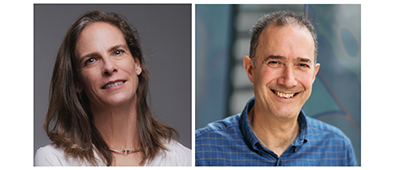Susan Lea and Jordan Raff elected Fellows of the Royal Society
Susan Lea is an internationally renowned structural biologist who has pioneered the use of mixed structural methods to study host-pathogen interactions and other medically important molecular pathways. Her laboratory uses and develops cutting-edge structural methods including cryo-electron microscopy and X-ray crystallography to define molecular mechanisms involved in health and disease states. Using these approaches, she has unpicked fundamental interactions that define an individual’s susceptibility to diseases such a bacterial meningitis, dysentery and typhi. Particular highlights include the recent determination of the molecular architecture of the bacterial flagellar motor, the prototypical biological machine.
Susan first joined the Dunn School as an Associate Professor in 2020, and was later appointed to the Chair of Microbiology in 2016. Since 2021 that Susan has been Chief of the Center for Structural Biology and Senior Investigator, National Cancer Institute, NIH Center for Cancer Research, Frederick, USA, although she still maintains a small team at the Dunn School. Other honours include membership of EMBO and the Academy of Medical Sciences.
Jordan Raff is an expert in centrosomes and cell division. Major discoveries by the Raff lab include the remarkable observation that flies lacking centrioles, centrosomes and cilia can proceed through most of development normally, changing the textbook view that centrioles/centrosomes are essential for mitosis. A systematic search for genes required for centriole/centrosome biogenesis led to the discovery that overexpressing a single gene (PLK4) amplifies centrosomes in most fly cells and predisposes them to tumours, suggesting a causative link between centrosome amplification and cancer. More recently, his team showed that just three proteins (Spd-2, Polo and Cnn) cooperate to form a scaffold that can potentially explain one of the great mysteries of centrosomes: how the two mitotic centrosomes in a cell always grow to the same size.
Jordan Raff joined the Dunn School in 2009 to take up the César Milstein Chair of Cancer Cell Biology. Other honours include membership of EMBO and the Academy of Medical Sciences, and more recently the Biochemical Society Excellence in Science Award.
Susan and Jordan join more than 60 fellows recognised by the Royal Society this year, which also include the Dunn School’s visiting professor Maria Leptin as Foreign Member. Other current Fellows of the Royal Society based at the Dunn School are Prof Matthew Freeman, Prof Nick Proudfoot and Prof Liz Robertson.
